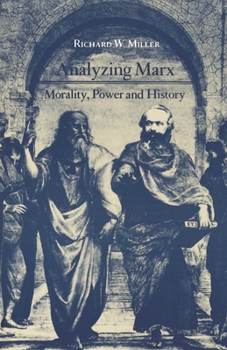Analyzing Marx: Morality, Power and History
Select Format
Select Condition 
Book Overview
In this book Marx is revealed as a powerful contributor to the debates that now dominate philosophy and political theory. Using the techniques of analytic philosophy to unite Marx's general statements with his practice as historian and activist, Richard W. Miller derives important arguments about the rational basis of morality, the nature of power, and the logic of testing and explanation. The book also makes Marx's theory of change useful for current social science, by replacing economic determinist readings with a new interpretation in which systems of power relations are the basis of change.
Format:Hardcover
Language:English
ISBN:0691066132
ISBN13:9780691066134
Release Date:September 1984
Publisher:Princeton University Press
Length:334 Pages
Weight:1.20 lbs.
Dimensions:1.1" x 5.9" x 8.8"
Customer Reviews
2 ratings
Excellent discussion of key issues in Marx
Published by Thriftbooks.com User , 15 years ago
I found this book extremely helpful on the whole. Key issues in Marxism, sometimes neglected within the tradition itself, are discussed and worked through in a straight-forward, clear manner. For instance, there is a lengthy discussion of the role of justice and the good in Marxism. In addition, there is a polemic directed against the allegedly "technological determinist" interpretation of historical materialism articulated by the late G.A. Cohen (see his 1978 book "Karl Marx's Theory of History"). Also, Miller's exegetical account of Marx's theory of the state is probably the best account there is anywhere in the literature. This tightly-argued section is refreshingly clear, and is made even clearer and more persuasive by way of contrast with contemporary alternatives in social science (e.g. Pluralism). Perhaps the strongest aspect of the book lies in its, in my view, successful fulfillment of the following aim: to articulate arguments meant to navigate the abstract theoretical pretensions of philosophy on the one hand, and the empiricist social-scientific aspirations of political science on the other. Too often, social scientists (esp. political scientists and economists, but also sociologists) have a theoretically anemic approach, whereas philosophers often neglect concrete features of actually existing social formations. Miller's aim, whether or not you agree that he makes good on it, should be a more common goal of those working in the general area of social and political thought. This is a must-read for anyone interested in theories of the state, the relationship between morality and socialism, the role of history in political theory, or the relationship between economic institutions and political power.
Interesting philosophical thinking on Marx
Published by Thriftbooks.com User , 16 years ago
An analytical philosopher gives his interpretation of some central themes in Marx's work. He argues: (1) the entire notion of morality as an idealist project is untenable, and that it is not clear that Marx really subscribed to a morality so conceived. (2) There is such a thing as a ruling class. (3) The technological-determinism theory of history that G.A. Cohen attributes to Marx is false, and Marx never held it. Rather he held to a socially-encompassing 'mode of production' theory of history. (4) Positivism provides for an empoverished notion of explanation that should be replaced with a causal realist one (without making overly grand metaphical claims).





